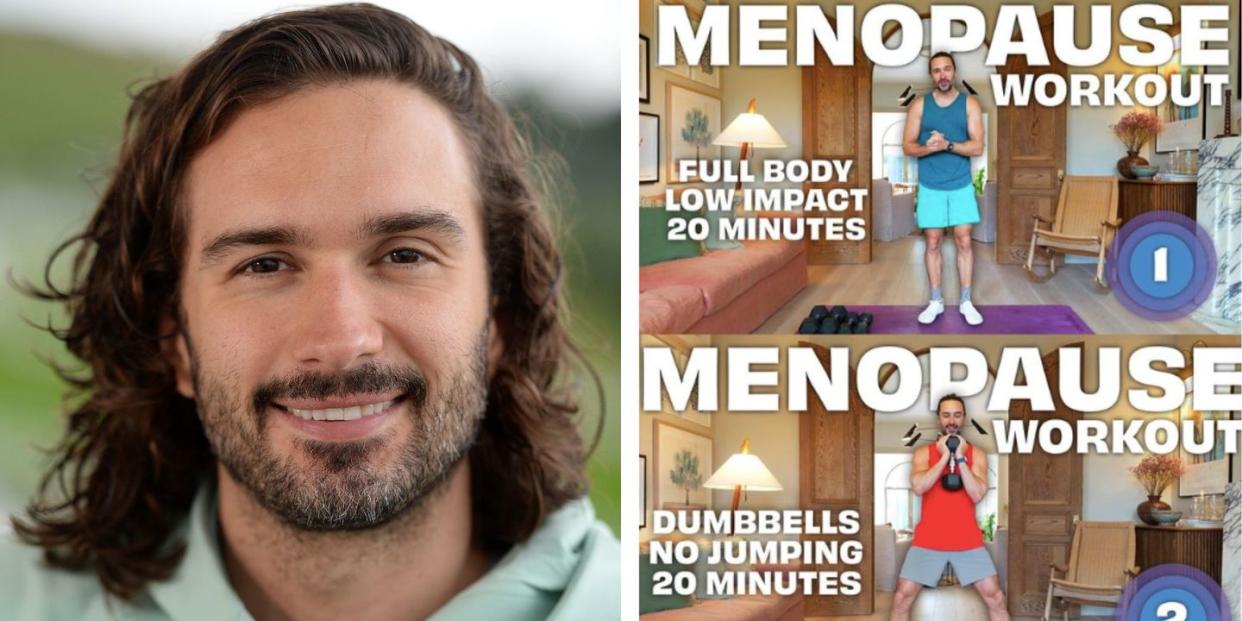Joe Wicks sparks debate with 'controversial' menopause workout

Joe Wicks has caused a stir on social media this week, after posting a preview of ‘two menopause strength workouts’ set to launch on his YouTube channel.
The 38-year-old father of three (soon to be four), known as The Body Coach, captioned the IG post: ‘Launching tomorrow at 8am on my YouTube channel. Two brand new Menopause Strength workouts.’ In the image, one is detailed as a full-body low-impact session, and the other a no-jumping dumbbell workout.
Many women took to the comments section to thank Joe for the workouts and for acknowledging that the menopause could require a different approach to exercise, but others took it as a ‘patronising label’.
One wrote: ‘Another patronising label given to women who aren’t young and pretty?’
Another said: ‘That makes me sad – I am menopausal, and I am fed up with it being a special thing – sorry but a workout doesn’t need to be specific for menopausal women and having this label all the time is undermining us as women with life experience who still have a lot to give – keep fit, eat well and get on with it.’
And a third added: ‘Please let us know why the menopause ladies need a different type of exercise? They need to jump less and lift some dumbbells instead? Basically, do less even though they feel capable for more? What’s next? Pensioners’ exercises?’
Others were keen to back Joe, explaining that by sharing menopause workouts, he is raising awareness around the subject.
Women’s Health Collective panellist and author of Owning Your Menopause Kate Rowe-Ham added: ‘I think it’s a great thing to raise awareness that we DO need to do things differently. I absolutely agree it doesn’t need to be menopause specific BUT we do need to look at and often change the way we train due to the myriad of symptoms that we may experience. I am stronger than ever having tailored my training and even written a book and created an app which Joe has been kind enough to highlight and support. It’s not a label it’s awareness and I really do feel as a PT who experienced changes that it’s important.’
Another said: ‘I don’t feel undermined at all. I’m glad it’s getting more talked about because it’s awful. I for one am happy that @thebodycoach is taking his time out to try and help. We should be more appreciative I think.’
And a third commented: ‘Anyone who is saying menopause isn’t a thing and doesn’t need a label is either blessed to not be experiencing symptoms or hasn’t been through it! Because it’s definitely a huge change in women’s lives and when you wake up one day and the way you eat and exercise no longer does anything for you it’s a scary place to be. You feel like you’ve lost control of your body! So thank you @thebodycoach, this is exactly what we need more of – tailored exercise plans focused for women in menopause.’
WHC panellist and menopause expert Kate Rowe-Ham also took to her own IG in response to the debate.
She wrote: ‘Do we need menopause specific workouts? Well this is a hard one to answer and it’s not straightforward. Essentially there is no such thing as a menopause workout, BUT we MUST and we DO need to do things differently or certainly make adjustments if things are no longer working.
‘You see for many of us navigating through this life stage at the moment, we are a generation of cardio bunnies and the thought of lifting weights is terrifyingly overwhelming. We are a carbohydrate phobic, less is more, small is better, wine solves everything, salad please cohort of women desperately trying to find out what works for us. Throw in a huge portion of misinformation from social media into the mix, on top of the myriad of symptoms you may experience and it’s no wonder we don’t know what to think.
‘So, yes, we do need more specific information, awareness and guidance because many of us are totally relearning how and why we need to move and nourish our bodies. I have firsthand experience of how hard this is and underpins everything I do.
‘Whilst we should seek to promote movement at any life stage, it is beneficial to know what changes might need to be implemented to ensure we train more effectively and efficiently through midlife and beyond.’
Thoughts?
Related stories:
How to exercise during the menopause and perimenopause, to ease symptoms
How to strength train in your 20s, 30s, 40s, 50s, 60s and beyond
"I'm 46 and going through perimenopause – how should I exercise?"
You Might Also Like


